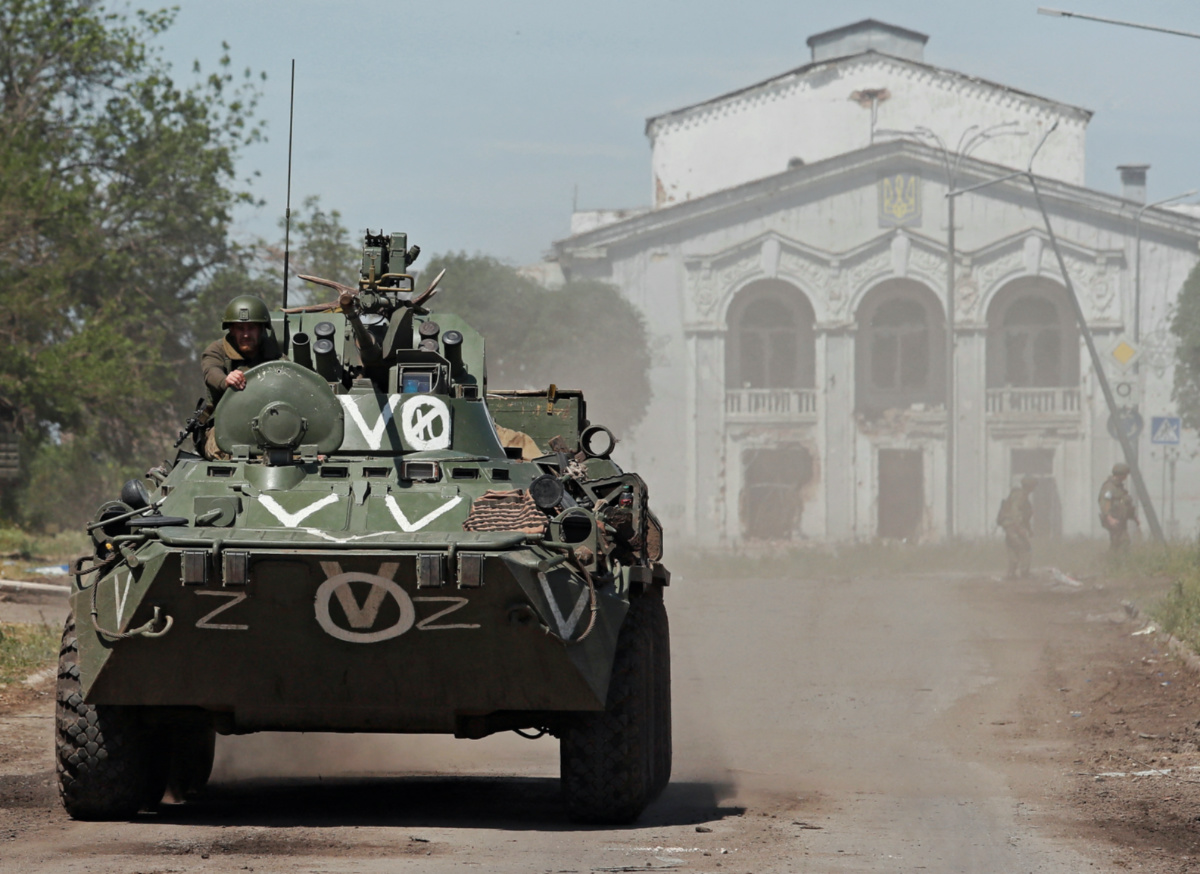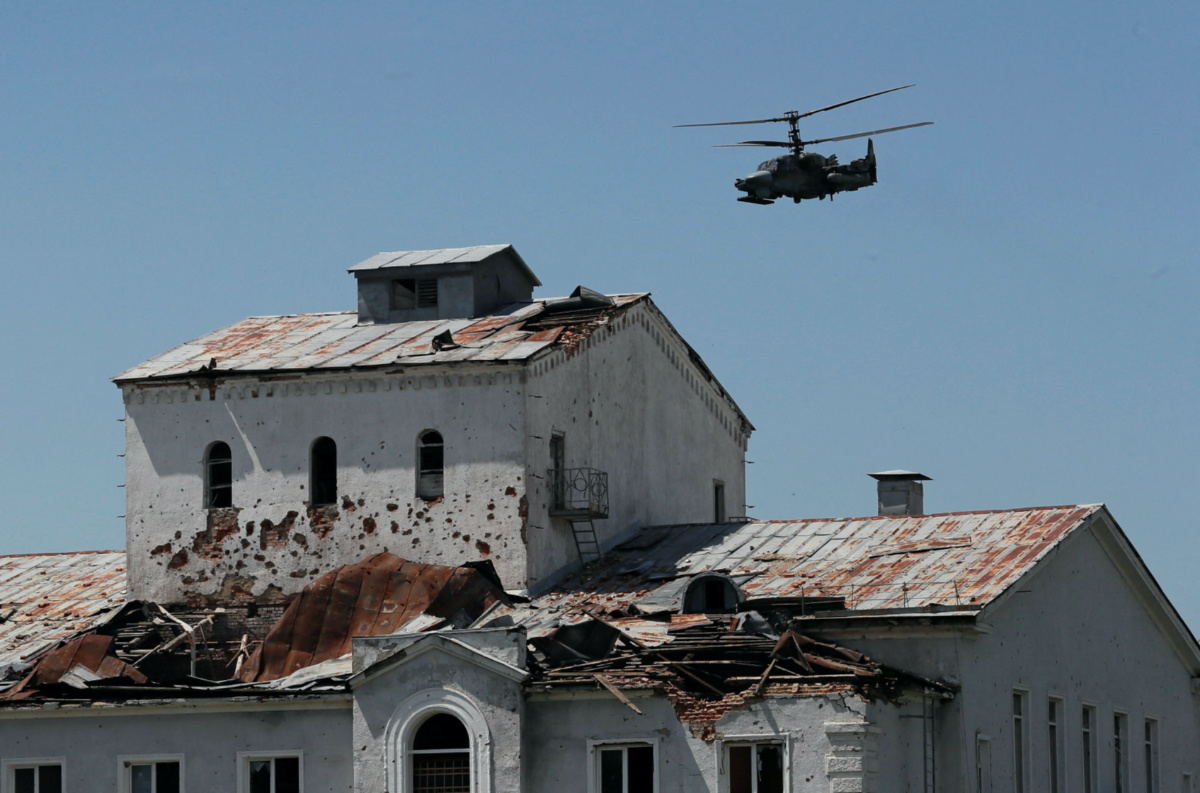Kyiv, Ukraine
Reuters
Russia tightened its grip on a key target in a battle for control of Ukraine’s eastern Donbas region while President Volodymir Zelenskiy pleaded for more Western arms to help Ukraine reach an “inflection point” and prevail in the war.
Zelenskiy told Luxembourg’s parliament via videolink on Thursday that Russian forces now occupied about a fifth Ukrainian territory, with battle lines stretching more than 1,000 kilometres.

A service member of pro-Russian troops rides on top of an armoured personnel carrier during Ukraine-Russia conflict in the town of Popasna in the Luhansk Region, Ukraine, on 2nd June. PICTUR: Reuters/Alexander Ermochenko.
As the invasion approaches its 100th day on Friday, Russia says Washington is adding “fuel to the fire” with a new $US700 million weapons package for Ukraine that will include advanced rocket systems with a range of up to 80 kilometres.
But separately addressing a forum in Slovakia, Zelenskiy said more weapons supplies would “ensure an inflection point in this confrontation,” in Ukraine’s favour.
HUNGARY SAYS ORBAN’S STANCE ON SANCTIONING PATRIARCH KIRILL “KNOWN FOR A LONG TIME”
Hungary’s opposition to potential EU sanctions against the head of the Russian Orthodox Church, Patriarch Kirill, “has been known for a long time,” Prime Minister Viktor Orban’s press chief told state news agency MTI on Thursday.
European Union leaders agreed in principle earlier this week on a 6th sanctions package against Russia. On Wednesday, three diplomats said Hungary was holding up the finalisation of the sanctions package, insisting on the removal of Patriarch Kirill from the list of sanctioned individuals.
MTI cited press chief Bertalan Havasi as saying that Hungary would keep to the agreement signed at the EU summit on sanctions earlier this week and that no one raised their voice against the Hungarian stance regarding Patriarch Kirill at the EU summit.
– KRISZTINA THAN/Reuters
US President Joe Biden hopes extending Ukraine’s artillery reach will help push Moscow to negotiate an end to a war in which thousands have been killed, cities and towns flattened and more than six million people forced to flee the country.
His administration said it had Ukraine’s assurances it would not use the rocket systems to hit targets inside Russia.
“Ukraine is fighting an exclusively defensive war, and we always state this,” the country’s deputy defence minister Hanna Malyar told a briefing when asked whether Kyiv made such a promise.
While Moscow denies targeting civilians it says it regards Ukrainian infrastructure used to bring in Western arms as a legitimate target. Still, it insisted those supplies would not change the course of what it calls a “special military operation” to disarm Ukraine and rid it of ultra-nationalists the Kremlin says threaten Russian security.
“Pumping [Western] weapons into Ukraine does not change all the parameters of the special operation,” Kremlin spokesman Dmitry Peskov told reporters.
“Its goals will be achieved, but this will bring more suffering to Ukraine,” Peskov said when asked whether US plans to sell Ukraine drones that can be armed with missiles could change the nature of the conflict.
Four Russian missiles hit railway infrastructure targets in two places in the western Lviv region bordering Poland late on Wednesday, injuring five people and causing significant damage, its governor said.
Donbas city in focus
Russian forces, backed by heavy artillery, control most of the eastern industrial city of Sievierodonetsk – now largely in ruins – after days of fierce fighting, Britain’s defence ministry said in its daily intelligence report.
Ukraine’s armed forces general staff said that besides its assault on the city, Russian troops were also attacking other parts of the east and northeast.
The capture of Sievierodonetsk and its smaller twin Lysychansk would give Russia control of all of Luhansk, one of two provinces along with Donetsk in the Donbas claimed by Moscow on behalf of separatists.
Seizing Luhansk would accomplish one of Russian President Vladimir Putin’s stated aims and shift battlefield momentum further in Russia’s favour after its forces were pushed back from the capital Kyiv and from northern Ukraine.
Moscow’s forces were also attempting to advance south towards the Ukraine-held cities of Kramatorsk and Sloviansk in Donetsk province, provincial governor Pavlo Kyrylenko said.

A Russian Ka-52 “Alligator” attack helicopter flies near a heavily damaged building during Ukraine-Russia conflict in the town of Popasna in the Luhansk Region, Ukraine, on 2nd June. PICTURE: Reuters/Alexander Ermochenko
Global impact
The war and Western sanctions imposed in response to it are taking a toll on the world economy. With its control of some of Ukraine’s biggest seaports and critical Black Sea shipping routes, Russia has been blocking Ukrainian farm exports and deepening a global food crisis.
Russia and Ukraine together account for nearly a third of global wheat supplies, while Russia is also a key fertiliser exporter and Ukraine a major supplier of corn and sunflower oil.
Interfax news agency quoted Russia’s defence ministry on Thursday as saying that vessels carrying grain could leave Ukraine’s Black Sea ports via “humanitarian corridors” with Moscow ready to guarantee their safety.
We rely on our readers to fund Sight's work - become a financial supporter today!
For more information, head to our Subscriber's page.
Ukraine’s foreign ministry spokesperson said earlier Kyiv was working with international partners on a United Nations-backed solution that would restore shipping routes there.
In another sign of the economic stress, Ukraine’s central bank jacked up its benchmark interest rate to a seven-year high to tackle soaring inflation and shield the hryvnia currency, while its boss called for talks with the International Monetary fund about a new funding programme.
As Washington blacklisted more individuals and entities with ties to the Kremlin, including a major steel producer and a cellist it called Putin’s middleman, the European Union gave final approval to a sanctions package that includes a 90 per cent cut in Russian oil imports by the end of the year. Moscow called the move “self-destructive”, saying it could destabilise global energy markets.
The conflict has also prompted Finland and Sweden to seek NATO membership, though alliance member Turkey has been blocking that move, accusing Stockholm and Helsinki of harbouring people linked to Kurdish militants.
The issue will come up when Biden hosts NATO Secretary-General Jens Stoltenberg at the White House on Thursday.
– With reporting by Reuters bureaux.






